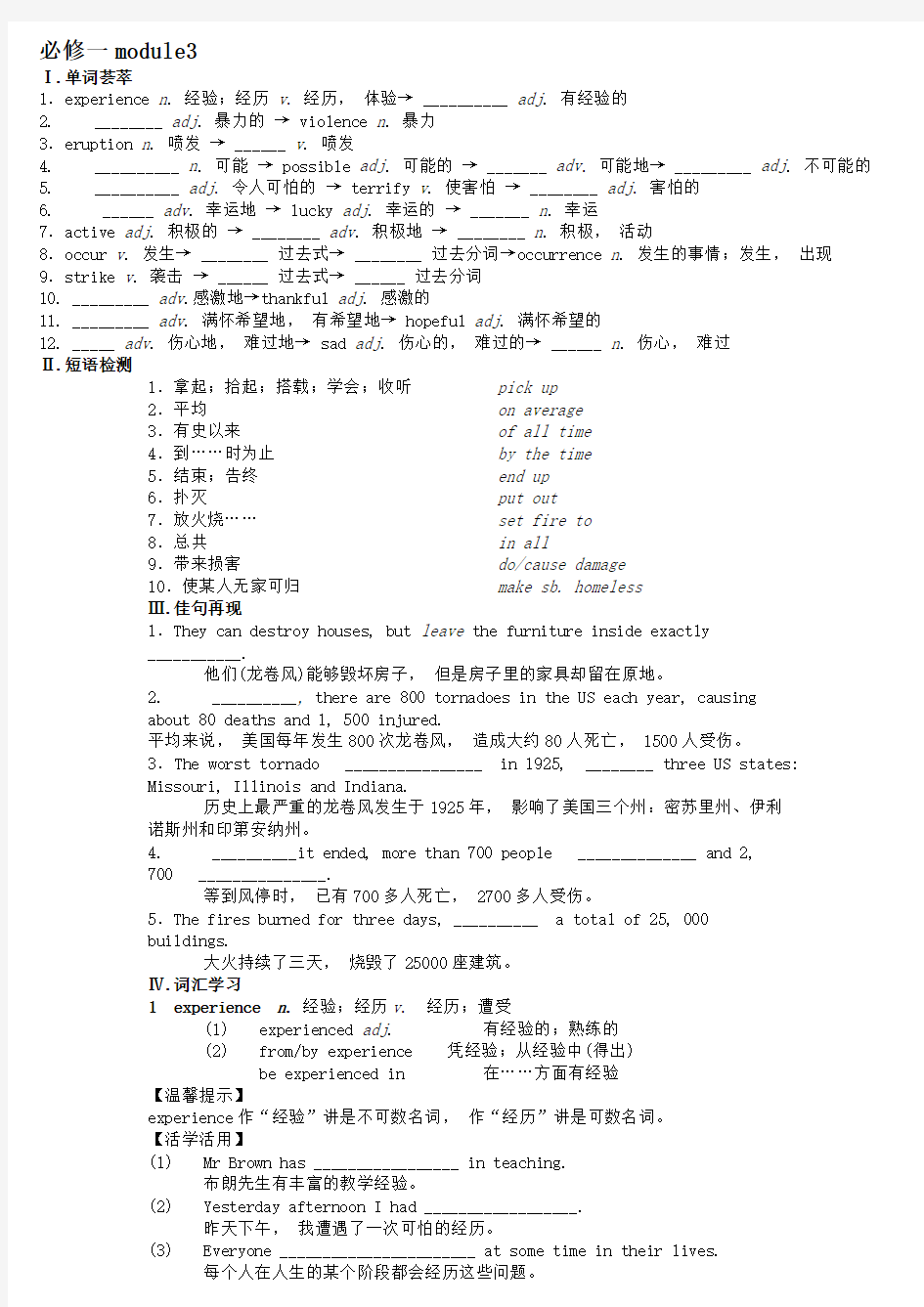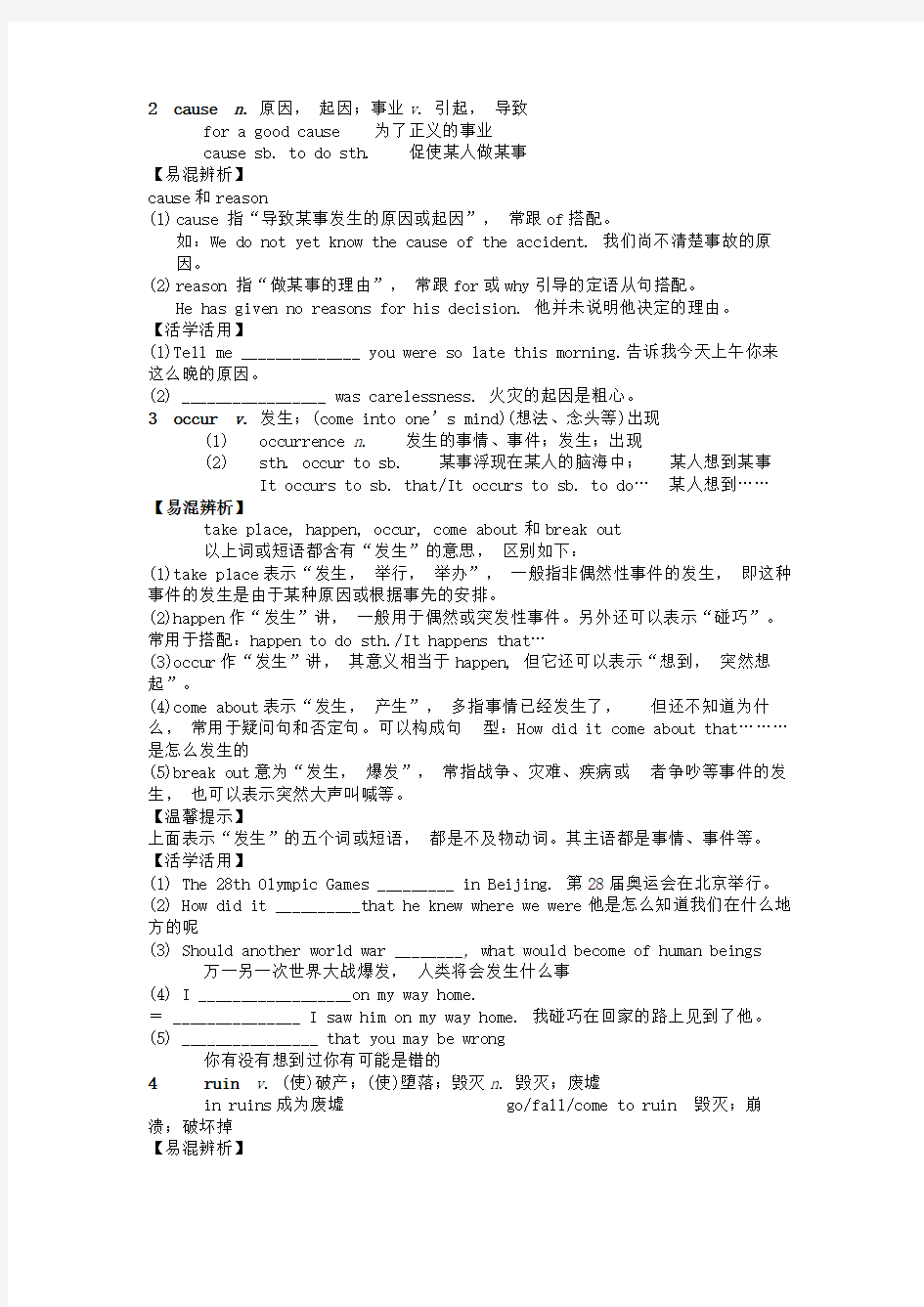外研版必修三module3重点知识与练习


必修一module3
Ⅰ.单词荟萃
1.experience n. 经验;经历v. 经历,体验→ __________ adj. 有经验的
2. ________ adj. 暴力的→ violence n. 暴力
3.eruption n. 喷发→ ______ v. 喷发
4. __________ n. 可能→ possible adj. 可能的→ _______ adv. 可能地→ _________ adj. 不可能的
5. __________ adj. 令人可怕的→ terrify v. 使害怕→ ________ adj. 害怕的
6. ______ adv. 幸运地→ lucky adj. 幸运的→ _______ n. 幸运
7.active adj. 积极的→ ________ adv. 积极地→ ________ n. 积极,活动
8.occur v. 发生→ ________ 过去式→ ________ 过去分词→occurrence n. 发生的事情;发生,出现9.strike v. 袭击→ ______ 过去式→ ______ 过去分词
10. _________ adv.感激地→thankful adj. 感激的
11. _________ adv. 满怀希望地,有希望地→ hopeful adj. 满怀希望的
12. _____ adv. 伤心地,难过地→ sad adj. 伤心的,难过的→ ______ n. 伤心,难过
Ⅱ.短语检测
1.拿起;拾起;搭载;学会;收听2.平均
3.有史以来
4.到……时为止
5.结束;告终
6.扑灭
7.放火烧…… 8.总共
9.带来损害
10.使某人无家可归pick up
on average
of all time
by the time
end up
put out
set fire to
in all
do/cause damage make sb. homeless
Ⅲ.佳句再现
1.They can destroy houses, but leave the furniture inside exactly
___________.
他们(龙卷风)能够毁坏房子,但是房子里的家具却留在原地。
2. __________, there are 800 tornadoes in the US each year, causing about 80 deaths and 1, 500 injured.
平均来说,美国每年发生800次龙卷风,造成大约80人死亡, 1500人受伤。3.The worst tornado ________________ in 1925, ________ three US states: Missouri, Illinois and Indiana.
历史上最严重的龙卷风发生于1925年,影响了美国三个州:密苏里州、伊利
诺斯州和印第安纳州。
4. __________it ended, more than 700 people ______________ and 2,
700 _______________.
等到风停时,已有700多人死亡, 2700多人受伤。
5.The fires burned for three days, __________ a total of 25, 000 buildings.
大火持续了三天,烧毁了25000座建筑。
Ⅳ.词汇学习
1 experience n. 经验;经历v. 经历;遭受
(1) experienced adj. 有经验的;熟练的
(2) from/by experience 凭经验;从经验中(得出)
be experienced in 在……方面有经验
【温馨提示】
experience作“经验”讲是不可数名词,作“经历”讲是可数名词。
【活学活用】
(1) Mr Brown has _________________ in teaching.
布朗先生有丰富的教学经验。
(2) Yesterday afternoon I had __________________.
昨天下午,我遭遇了一次可怕的经历。
(3) Everyone _______________________ at some time in their lives.
每个人在人生的某个阶段都会经历这些问题。
2 cause n. 原因,起因;事业v. 引起,导致
for a good cause 为了正义的事业
cause sb. to do sth. 促使某人做某事
【易混辨析】
cause和reason
(1)cause 指“导致某事发生的原因或起因”,常跟of搭配。
如:We do not yet know the cause of the accident. 我们尚不清楚事故的原因。
(2)reason 指“做某事的理由”,常跟for或why引导的定语从句搭配。
He has given no reasons for his decision. 他并未说明他决定的理由。
【活学活用】
(1)Tell me ______________ you were so late this morning.告诉我今天上午你来这么晚的原因。
(2) _________________ was carelessness. 火灾的起因是粗心。
3 occur v. 发生;(come int o one’s mind)(想法、念头等)出现
(1) occurrence n. 发生的事情、事件;发生;出现
(2) sth. occur to sb. 某事浮现在某人的脑海中;某人想到某事
It occurs to sb. that/It occurs to sb. to do…某人想到……【易混辨析】
take place, happen, occur, come about和break out
以上词或短语都含有“发生”的意思,区别如下:
(1)take place表示“发生,举行,举办”,一般指非偶然性事件的发生,即这种事件的发生是由于某种原因或根据事先的安排。
(2)happen作“发生”讲,一般用于偶然或突发性事件。另外还可以表示“碰巧”。常用于搭配:happen to do sth./It happens that…
(3)occur作“发生”讲,其意义相当于happen, 但它还可以表示“想到,突然想起”。
(4)come about表示“发生,产生”,多指事情已经发生了,但还不知道为什么,常用于疑问句和否定句。可以构成句型:How did it come about that………是怎么发生的
(5)break out意为“发生,爆发”,常指战争、灾难、疾病或者争吵等事件的发生,也可以表示突然大声叫喊等。
【温馨提示】
上面表示“发生”的五个词或短语,都是不及物动词。其主语都是事情、事件等。【活学活用】
(1) The 28th Olympic Games _________ in Beijing. 第28届奥运会在北京举行。
(2) How did it __________that he knew where we were他是怎么知道我们在什么地方的呢
(3) Should another world war ________, what would become of human beings
万一另一次世界大战爆发,人类将会发生什么事
(4) I __________________on my way home.
= _______________ I saw him on my way home. 我碰巧在回家的路上见到了他。(5) ________________ that you may be wrong
你有没有想到过你有可能是错的
4 ruin v. (使)破产;(使)堕落;毁灭n. 毁灭;废墟
in ruins成为废墟 go/fall/come to ruin 毁灭;崩溃;破坏掉
【易混辨析】
ruin, damage, destroy和harm
(1) ruin 一般指对物体或生命彻底的破坏,但往往是非暴力的,也往往不是一次性打击的结果,常指对美好的或希望中的事物的破坏。
(2) damage 一般指对物体或生命的局部损伤,使整体的价值或作用降低或变得无价值、无作用。它既可作名词,也可作动词。作名词时常构成搭配:
cause/do damage (to…)(对……)造成损害。
(3) destroy 往往指对某物体进行完全的毁坏,使之无法恢复。
(4) harm 一般指伤害有生命的东西,常指伤及人的健康、权利、事业等。What he faced ruined his hope. 他所面对的使他的希望破灭了。
The whole city was destroyed in the earthquake. 整个城市在地震中被毁掉了。We wanted to have a look at the ruins of Pompeii. 我们想看一下庞贝城的废墟。
They managed to repair the houses that had been damaged.
他们设法修复了受到破坏的房子。
【活学活用】
用ruin, damage或destroy的适当形式填空
(1)The rain caused great ________ to the crops.
(2)The building was completely ________ in the fire.
(3)She poured water all over my painting, and ________ it.
5 strike v. 打;碰撞; (突然)袭击;突然想到;让(某人)觉得,留下……印象;擦(火柴);钟敲响n. 罢工
It strikes me that…某人突然想到/意识到…… be deeply struck 被深深打动
strike sb. as… 让某人觉得…… be on strike 在罢工
go on strike 举行罢工
【易混辨析】
strike, hit和beat
(1) strike指用力地“打击”,表示短暂的动作,含有急速的或突然的一次性的殴打、打击或敲击,是普通用词,有时与hit通用,并用于比喻意义。(2) hit 指“打”时,侧重于对某一点“打中,击中”,或有目的地打,表结果。
(3) beat 指“连续殴打,击败”,也指心脏的“跳动”。
【活学活用】
1. 根据语境判断strike在下列句中的含义
(1)The plan strikes me as ridiculous. ___________
(2)His knee struck against the chair. ________
(3)It was dark in the room so he struck a match. ________
(4)An earthquake struck this area last year. ________
(5)A good idea struck me and I decided to go abroad. ________
2. 用beat, hit或strike的适当形式填空
(1)When she heard the bad news, her heart _____ fast.
(2)They left the house when the clock ______ twelve.
(3)I was deeply ______ by the beauty of the country.
(4)It ______ me that there was no one at home.
(5)A bullet ___ him on the leg.
Ⅴ短语学习
1 set fire to 放火烧……;使……燃烧
set… on fire 放火烧;使燃烧 catch fire着火;起火
be on fire燃烧着 make a fire生火
put out fire 扑火 play with fire 冒大风险;玩火
【活学活用】
(1)It took firemen several hours ________________ (扑灭火).
(2)It seems that something ______________ (已经着火).
(3)The house _______ (在燃烧).
(4)Anyone who _________ (放火烧) the building can’t escape punishment.
2 take place 发生;举行
take sb.’s place/take the place of 代替;接替
in place of 代替 in place在正确的位置;适当
out of place 在错误的位置;在不适当的位置
in sb.’s place 处于某人的位置
【活学活用】
(1)The contest __________ every four years. 该赛事每4年举行一次。
(2)Jane was absent, and I had to find someone to _________ .简没来,我只好找个人替她。
(3) Try to put yourself __________ and think how you would feel.
把自己放在我的位置上,想想你会有什么感觉。
(4) Some of these files seem to be ___________. 有些档案似乎没放对地方。
3 end up 结果为……;以……结束
(1)put an end to sth. 使某事结束,终止
bring sth. to an end 使某事结束,终止 come to an end 结束;终止(2)on end 连续地;竖着;直立地 in the end 最后;终于
at the end of…在……结束时 by the end of 到……结束时为
止
make ends meet 使收支相抵
【温馨提示】
end up往往指意料之外的结果,后面可以加动名词、介词短语或形容词。如:
If you continue to steal, you’ll en d up in prison. 你要是继续行窃,终归得进监狱。
We were going to go out, but ended up staying at home.
我们原计划外出,但结果却是呆在家里了。
If he carries on driving like that, he’ll end up dead. 他照那样开车,早晚得死于非命。
【活学活用】
(1) What did the teacher say ____________ her lecture 在上课结束时老师说了
什么
(2) He had to give up _________.他最终不得不放弃。
(3) At first he refused to accept any responsibility but he _________ apologizing.
最初他拒不承认有任何责任,到头来还是道了歉。
【句式点拨】
这两个句子都是现在分词作结果状语,表示意料之中的结果,起补充说明的作用。而不定式作结果状语则表示意料之外的结果。
【活学活用】
(1)He dropped the plate, _________ it into a hundred pieces.
他把盘子掉地上了,摔成了碎片。
(2)He got well prepared for the interview, _____________ that the interview was cancelled.
他精心为面试做好了准备,结果却被告知,面试取消了。
Ⅱ.选词填空
in all, set fire to, by the time, pick up, on average
1. __________ you arrive, I will have left.
, I spend two hours doing my homework every day.
3.Sorry, I have to go to _______ my son from school.
4.How much money does he owe you ______
5.Have the police found out who ________ the building
Ⅲ.单项填空
1.[2010·天津卷] It rained heavily in the south,________ serious flooding in several provinces.
A. caused
B. having caused
C. causing
D. to cause
【解析】 C 现在分词作状语,起补充说明的作用。
2.[2010·天津卷] Joining the firm as a clerk, he got rapid promotion, and ________ as a manager.
A. ended up
B. dropped out
C. came back
D. started off
【解析】 A 考查动词短语。end up= as a result=it turns out to be 结果是,以……为结局。
3.[2011·安徽卷] ________ , I managed to get through the game and the pain was worth it in the end.
A. Hopefully B.Normally C. Thankfully
D.Conveniently
【解析】 C 考查副词。hopefully怀有希望地;normally通常地;thankfully感激地,感谢地;conveniently方便地。句意:谢天谢地我最终成功地完成了比赛,所受的痛苦都是值得的。根据句意,C为正确答案。
4.Encourage your children to try new things, but try not to ________ them too hard.
A.draw B.strike C.rush D.push
【解析】 D 考查动词辨析。句意:鼓励你的孩子去尝试新事物,但不要把他们逼得太紧了。push 推,挤,逼迫;strike 打,罢工,划燃;rush 冲进,匆促行事,催;draw 拉,拖,挨近,提取,画,绘制。根据句意,应选D。
5.By the time he realizes he ________ into a trap, it’ll be too late
for him to do anything about it.
A.walks B.walked C.has walked D.had walked
【解析】 C 考查时态。句意:等到他意识到他已经掉进了一个陷阱的时候,对他来说做什么补救措施都为时已晚。在表时间、条件、让步的状语从句中,现在完成时可用来表示将来某时以前已完成的动作。
6.I got caught in the rain and my suit ________ .
A.has ruined B.had ruined C.has been ruined D.had been ruined
【解析】 C 考查动词的时态和语态。很显然,主语my suit和谓语动词ruin 之间是被动关系,但had been ruined又不符合时间关系,所以只有选C。当然此题如果用was ruined, 也是可以的。
7.Some of these books are ________ . Please put them in right order. A.out of order B.out of place C.out of control D.out of the question
【解析】 B out of place (=in the wrong place or at the wrong time; not suitable; improper)(作表语用)在错误的位置;不适宜,不得体。句意:有些书位置不对,请把它们按顺序放好。
8.It ________ that she was out when we called.
A.struck B.came about C.occurred D.happened
【解析】 D It happens that…碰巧发生某事。句意:我们打电话时她碰巧出去了。9.The flood this summer caused serious ________ to the crops in Northeast China.
A.damage B.harm C.hurt D.injury 【解析】 A damage意为“损坏,毁坏”;harm指精神上或物质上的危害;hurt多指精神或感情方面的伤害; injury着重指偶然事故对人的“损害”。damage符合句意。
10.He felt rather ________ as he was the only person who wore sportswear at the dinner party.
A.in place B.in the way C.by the way
D.out of place
【解析】 D out of place的意思是“位置不当,不得体,不适当”。in place 在适当的位置,适当;in the way以某种方式;by the way顺便。由句意可知应选D。
